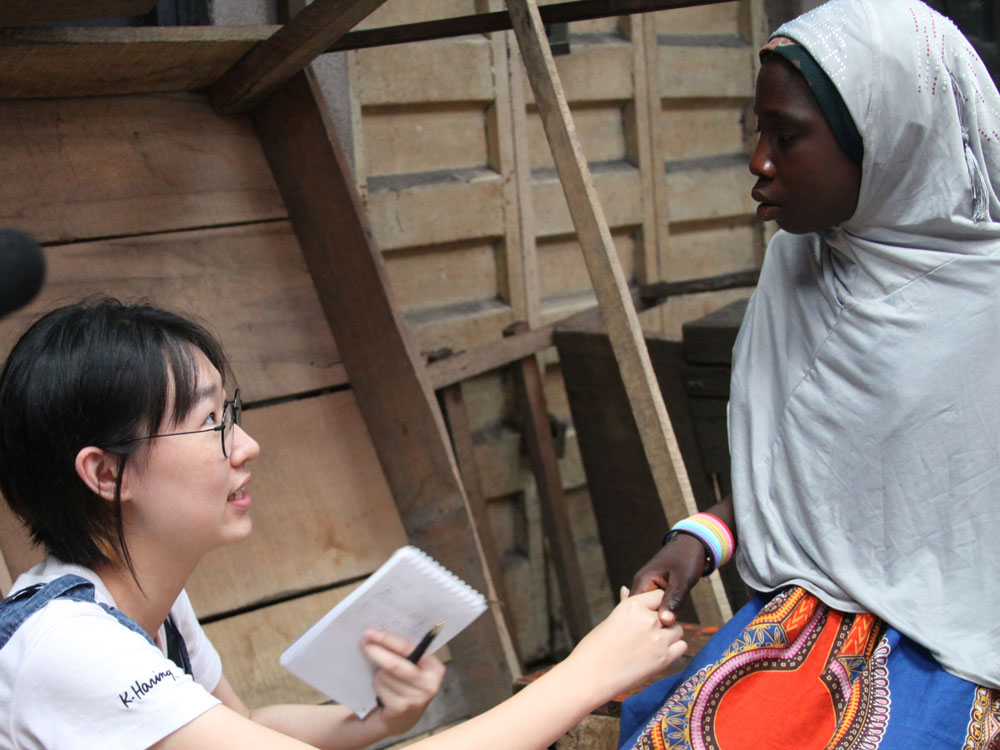Global partnerships lead to empathetic storytelling in Lebanon and Nigeria
Access to Health, Northwestern’s interdisciplinary health and human rights project, links Medill journalists with local partners, shedding light on global health and human rights issues

In 2017, Elijah Atinkpo and his entire community were forcefully and violently evicted from their homes in Lagos, Nigeria. About 800 homes were torched, and 10,000 people left homeless—all to create the royal Elegushi family’s new commercial development project.
Atinkpo, who works for an NGO called the Justice & Empowerment Initiatives (JEI), hadn’t had the chance to see his former home until July this summer.
“The return home had a huge emotional impact on Elijah, and he broke down after trying to determine the location of where his home used to be,” said Dan Order, who graduated from the Masters of Journalism program at the Medill School of Journalism, Media, Integrated Marketing Communications, in August.
Order and his classmate Kaitlin Englund traveled to Lagos in July to create a video documentary and print story on the eviction. As far as Order could tell, they were the only journalists to have returned to the land since the evictions—a feat made possible through a novel partnership between Medill and Northwestern’s Access to Health (ATH) program, and ATH’s local partner organizations.
ATH, a project supported by Northwestern Pritzker’s Center for International Human Rights, Feinberg’s Center for Global Health and Program in Public Health and the Kellogg Public-Private Interface, takes a unique approach to development work at a university. Instead of choosing its own projects, ATH only works at the invitation of local organizations or community leaders to assist with a particular health and human rights related problem.
This year, for the first time, ATH connected eight Medill graduate students and two faculty advisors with long-time partner organizations in Nigeria and Lebanon to tell stories on community evictions, child trafficking, LGBT issues, domestic workers’ issues, access to education and child marriage.
“A journalist’s perspective is vital to the communities in which we work, partnerships we forge and the issues we tackle,” said Juliet Sorensen, the Director of the Bluhm Legal Clinic at Pritzker and the founder and director of ATH. “The media has a way to advocate and shine a light on issues in a way that is different and less constrained than the law.”
ATH and Medill in Lebanon
In Lebanon, ATH linked Medill students to Basmeh & Zeitooneh, a local organization that works with Syrian refugees to develop revenue-generating activities for women.
Throughout ATH’s partnership with the organization, they have enlisted Pritzker students to delve into employment restrictions on Syrian refugees in Lebanon and Kellogg students to assist women’s workshops with marketing their artisanal work and refugee-empowerment message to customers around the world.
Four Medill graduate student reporters and faculty advisor Craig Duff, a Medill professor who specializes in video and broadcast journalism, visited Lebanon in the spring. Their stories focused on child marriage among Syrian refugees, domestic workers’ experiences, local efforts to address LGBT issues and access to education among Syrian children.
ATH and Medill in Lagos, Nigeria
In Nigeria, ATH works with JEI to address low levels of health literacy among slum inhabitants. With local collaborators, the ATH team designed a community health educator process and appointed a Lagosian project manager in the city to manage curriculum and training.
In July, Brent Huffman, an associate professor at Medill and documentary filmmaker, took four Medill graduate students to Lagos to make two character-based short documentaries on child trafficking and forced eviction. The documentaries will premiere on Al Jazeera Shorts in late 2018.
By the end of the trip, Huffman said the students didn’t want to leave.
“We all fell in love with the city and saw the amazing value of the kind of work JEI does and the value of the kind of reporting we were doing to spread awareness and be a catalyst for positive change,” said Huffman.
More about ATH
Throughout the years, ATH has assembled an array of diverse projects, including working with rural communities in Mali to address female genital cutting, collaborating with healthcare providers in the Dominican Republic to increase the quality of patient service, and assessing the health and human rights impacts of gun violence in Chicago. Currently, ATH has projects in Kenya, India, Nigeria, Lebanon and Chicago.
Using its cross-school connections, ATH gathers a mix of graduate students and business, medical and law faculty to work on impactful solutions to add value to the site in need.
An associated class, called Health and Human Rights, assembles law, business and public health students into teams of consultants to research and innovate new approaches to common issues, based on feedback from community-based partners.
Elise Meyer, ATH’s Schuette Clinical Fellow who assists with all ongoing projects, also helped actualize the partnership with Medill. Bringing journalists into the project was an important part of their advocacy work, she said.
“Journalism presents a powerful medium to advocate for change, highlight issues, and bring attention to marginalized communities,” said Meyer. “Journalism is especially important to communities like slums and informal settlements in Lagos and the refugee camps in Lebanon, both of which are isolated and (willfully) ignored by the public.”
“The new Medill-ATH partnership demonstrates the breadth of depth and expertise that a research university like Northwestern can offer, in not just providing technical expertise on the ground, but also providing an outlet for our local partners to tell their stories.” said Sorensen. “Health access takes multidisciplinary partnership to address complicated societal issues.”
This article originally appeared on the Northwestern International Relations website.

